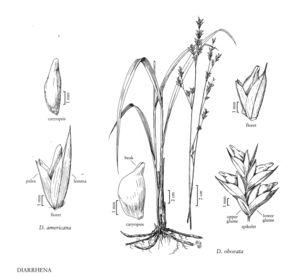Difference between revisions of "Diarrhena obovata"
FNA>Volume Importer |
imported>Volume Importer |
||
| (8 intermediate revisions by 2 users not shown) | |||
| Line 17: | Line 17: | ||
-->{{Treatment/Body | -->{{Treatment/Body | ||
|distribution=Kans.;Nebr.;Okla.;W.Va.;Pa.;Tex.;Md.;Ind.;S.Dak.;Minn.;Ky.;Mich.;Ohio;Wis.;Tenn.;N.Y.;Va.;Ark.;Ill.;Ont.;Iowa;Mo. | |distribution=Kans.;Nebr.;Okla.;W.Va.;Pa.;Tex.;Md.;Ind.;S.Dak.;Minn.;Ky.;Mich.;Ohio;Wis.;Tenn.;N.Y.;Va.;Ark.;Ill.;Ont.;Iowa;Mo. | ||
| − | |discussion=<p>Diarrhena obovata is restricted to the Flora region, growing in rich woodlands from South Dakota to Ontario and New York and south to Texas, Tennessee, and Virginia. It is most common in the prairie states.</p> | + | |discussion=<p><i>Diarrhena obovata</i> is restricted to the Flora region, growing in rich woodlands from South Dakota to Ontario and New York and south to Texas, Tennessee, and Virginia. It is most common in the prairie states.</p> |
|tables= | |tables= | ||
|references= | |references= | ||
| Line 26: | Line 26: | ||
-->{{#Taxon: | -->{{#Taxon: | ||
name=Diarrhena obovata | name=Diarrhena obovata | ||
| − | |||
|authority=(Gleason) Brandenburg | |authority=(Gleason) Brandenburg | ||
|rank=species | |rank=species | ||
| Line 33: | Line 32: | ||
|basionyms= | |basionyms= | ||
|family=Poaceae | |family=Poaceae | ||
| + | |illustrator=Linda Ann Vorobik;Hana Pazdírková | ||
| + | |illustration copyright=Utah State University | ||
|distribution=Kans.;Nebr.;Okla.;W.Va.;Pa.;Tex.;Md.;Ind.;S.Dak.;Minn.;Ky.;Mich.;Ohio;Wis.;Tenn.;N.Y.;Va.;Ark.;Ill.;Ont.;Iowa;Mo. | |distribution=Kans.;Nebr.;Okla.;W.Va.;Pa.;Tex.;Md.;Ind.;S.Dak.;Minn.;Ky.;Mich.;Ohio;Wis.;Tenn.;N.Y.;Va.;Ark.;Ill.;Ont.;Iowa;Mo. | ||
|reference=None | |reference=None | ||
| Line 38: | Line 39: | ||
|publication year= | |publication year= | ||
|special status= | |special status= | ||
| − | |source xml=https:// | + | |source xml=https://bitbucket.org/aafc-mbb/fna-data-curation/src/200273ad09963decb8fc72550212de541d86569d/coarse_grained_fna_xml/V24/V24_74.xml |
|subfamily=Poaceae subfam. Pooideae | |subfamily=Poaceae subfam. Pooideae | ||
|tribe=Poaceae tribe Diarrheneae | |tribe=Poaceae tribe Diarrheneae | ||
Latest revision as of 16:25, 11 May 2021
Culms 48-131 cm, glabrous. Sheaths, collars, and auricles glabrous or pubescent; ligules 0.2-1 mm; blades 24-72 cm long, 6-18 mm wide, abaxial surfaces glabrous or scabridulous, adaxial surfaces similar or pubescent, margins usually scabridulous, rarely smooth. Panicles 5-30 cm, with 4-33 spikelets. Spikelets 7-17 mm, oblong to ovate, with (2)3-5(7) florets. Glumes green to stramineous; lower glumes 1.7-3.7 mm long, 0.3-0.6 mm wide in profile, 1-3-veined; upper glumes 2.2-5.2 mm long, 0.75-1.5 mm wide in profile, (3)5-veined; calluses glabrous; lemmas 3.7-7.5 mm, widest near or above the middle, obovate or elliptic in profile, abruptly tapering, apices sharply cuspidate; paleas glabrous, keeled, apices usually bifid, rarely truncate, sinuses 0.05-0.3(0.5) mm deep; anthers 1.4-2 mm. Caryopses 4.1-6 mm long, 1.8-2.5 mm wide, broadly elliptic to obovate in outline, narrowing abruptly to a bottlenose-shaped beak, usually smooth, occasionally wrinkled, shiny, usually straw-colored, with occasional brown areas basally. 2n = 60.
Distribution
Kans., Nebr., Okla., W.Va., Pa., Tex., Md., Ind., S.Dak., Minn., Ky., Mich., Ohio, Wis., Tenn., N.Y., Va., Ark., Ill., Ont., Iowa, Mo.
Discussion
Diarrhena obovata is restricted to the Flora region, growing in rich woodlands from South Dakota to Ontario and New York and south to Texas, Tennessee, and Virginia. It is most common in the prairie states.
Selected References
None.
